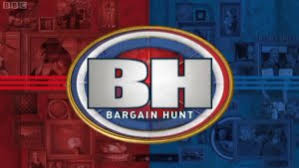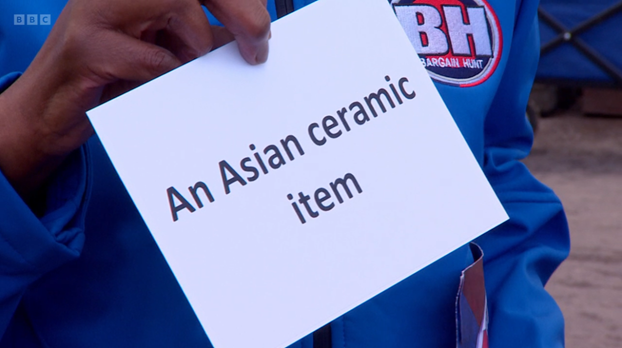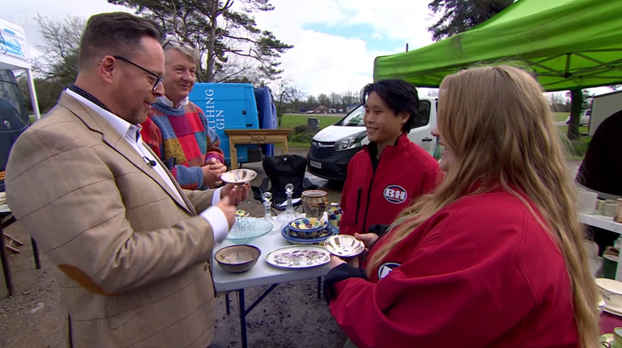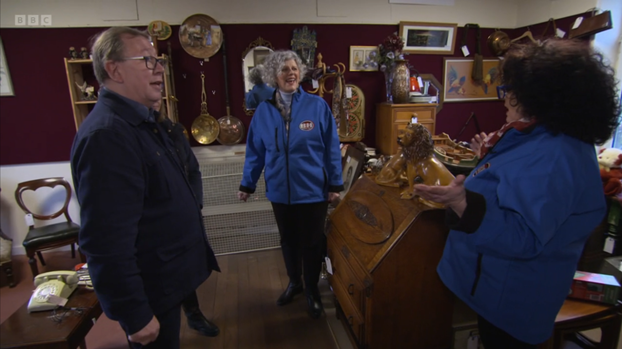
Introduction
Launched in 2000, Bargain Hunt is a BBC television program that almost every adult in Britain has watched at some time. Broadcast in the early afternoon it’s a staple for many who spend their days, for whatever reason, at home. According the viewing figures from 2023, about 1.6m people watch it daily. This puts it well above most other daytime television programs in popularity.
Bargain Hunt has never claimed to be any more than light entertainment and sometimes comes in for criticism for being “cheap television”. Even it’s most enthusiastic supporters would probably admit that it’s a bit of a guilty pleasure. In addition, Bargain Hunt has quite an impact on the antiques world, for both good and ill.
What’s it all about?
The format of Bargain Hunt has changed a little over the years but in essence it remains the same as it ever was. By today’s standards, it’s quite a complex program format, considerably more so than many daytime game shows. The small changes over the years have probably improved the format but each has added complexity.
In essence, two teams of two people get an hour to buy three items at either a large antiques shop or fair. They have a limit on what they can spend and they get the assistance of an expert. At some stage later, the items go to auction, along with an additional item purchased by their expert using whatever money the team had left over. At the time of writing, that limit is £300 per team.
Currently, there are two other conditions. Firstly, one item must cost at least £75. This is to stop teams from simply buying three very low value items. It made for dull and rather repetitive programs, but was an effective technique for finishing cash positive.

The second condition says that one item must satisfy a challenge set at the start of the program. Each team gets a different challenge but they are often related. A recent example being an item related to a king for one team and an item related to a queen for the other team. This challenge is usually fairly simple to adhere to and it gives the teams something to focus on when they are looking.


The teams and their experts get an hour to go off and buy their items. This forms the main part or the program and is usually the most interesting. After the purchasing there is a recap of what’s been bought, presumably for those of us with poor memories and a tendancy to fall asleep after lunch. Following a brief interlude where the presenter goes off to visit somewhere of interest. This can be very good, although it also provides older viewers a chance to get a cup of tea to wake themselves up and go to the bathroom. At least, that’s what I generally do.
The closing part of the program is filmed at an auction house a few weeks later. The auctioneer gets to comment on each item and provide an estimate of what they think the items will make. Until they have provided their estimate, the auctioneer is not informed what the items cost. The auctioneer’s reaction on learning that an item has cost several times their estimate is always fun (if somewhat maliciously so).

The auctioning of each team’s items then takes place. The teams then get to see the item their expert has purchased for them and hear what it cost. They have the choice as to whether they want to include their expert’s item in their score or not. The item is then sold.
The winner is then simply the team that has made the most money or more usually the team that has lost the least. There is a nominal extra prize of a “Golden Gavel” for any team that makes a profit on all three of their items. This is quite a rare event, although on the first episode I ever saw, both teams achieved this. I got the impression it must be very easy!
Who watches this stuff?
Bargain Hunt is sometimes picked out as an example of cheap, poor quality television; the sort that the BBC should not be making. I think this is unfair. It provides lightweight entertainment and, if you watch it often enough, you can learn quite a bit about lower value antiques.
The program is mainly popular with older viewers and apparently almost no one under the age of 34 watches it. That matches the demographic of people who go out to antiques fairs and visit antiques shops so it does have a target audience. The same demographic also tends to be the most reliable at turning out to vote, so politicians should take before they suggest the program should be taken off the air. I’d like to think that a politician would lose their seat in an election for complaining about Bargain Hunt.
The positives that Bargain Hunt brings to the antiques business
Bargain Hunt isn’t the only television program in Britain that features buying and selling antiques. I actually prefer Antiques Roadtrip (much less so the celebrity version) as this has a more realistic feel to it, but Bargain Hunt is clearly easier to make and so gets the most airtime. However, these two programs aside, there aren’t any other competition based antiques programs that work coherently.
Bargain Hunt undoubtedly makes a great contribution to the popularising of the world of antiques, auctions and auctioneers. It educates a little (actually quite a lot of you watch it for years) and it goes a long way to demystifying the business. If you don’t live near one of the big antiques fairs you might never realise that they even exist. Indeed I know from talking to friends that even if you do, they still seem to pass many people by.
Auctions seem to have a bit of mystique for many people even for those who watch antiques programs on television. The perennial question of “can anyone attend” never seems to be answered by the rather obvious fact that yes, anyone can.
Bargain Hunt makes minor television stars of some of the more entertaining people in the antiques world. For these people, a little stardom provides a well earned boost to their careers and businesses, which makes the time taken to do the filming very worthwhile. Several of the experts have raised their profile via Bargain Hunt which has no doubt helped them when they start their own auction houses.
Some of the experts are very good performers in front of a camera and are something of a disappointment if you meet them off air. However, most seem to be very pleasant. Success in the world of antiques requires being very good with people, so to get as far as being an expert on Bargain Hunt you need to be personable.
A word of caution; if there is an auctioneer you fancy seeing live, don’t be too disappointed if you turn up to one of their auctions only to find they aren’t running the show. Sadly, I’m not sure if Charles Hanson ever runs an auction these days unless the television cameras are present. This isn’t a complaint, he has a very large auction business now and probably rarely ever sees an actual antique now. On the other hand, if you turn up to Serrell’s auction house in Malvern, Philip Serrell will almost certainly be up there, no doubt being grumpy and entertaining in equal measures.
If you’re in doubt, check out a live feed from the auction house of interest and see who’s holding the gavel. Check in a few times though. Few auctioneers will do more than about three hundred lots without handing over to someone else for a break.
There’s always a down side…
I purposefully started with some of the positives that I think Bargain Hunt brings to the world of antiques and I’m honestly certain these greatly outweigh the negatives, but negatives there are. Like all people in business, antiques dealers like to complain and so the negative effects of Bargain Hunt get far more of a mention around the antiques shops of the country than the positives.
How much?! The thorney question of discounts
The biggest issue is always the question of discounts. I’ve written about discounts in more detail previously as they are a thorny subject. In short, if you’re paying more than about £30 for an item you can usually ask for a discount of about 10% off the ticket price. Below £30 you can always ask but please don’t complain if you’re told no. Increasingly on precious metals discounts are less common due to the recent rise in bullion prices.
On Bargain Hunt you will rarely see a discount offered that is less that about 20%. Sometimes it’s even more. This is especially so in shops or centres where the owner is handling the sale. Television viewers with no real world experience of antiques shops could be forgiven for believing that all antiques shop staff are happy to negotiate for five minutes, whilst chearfully giving a 25% discount. This might even include ringing the dealer whose stock is being discussed
When there are no cameras, I’m afraid it’s not like that. Staff will tell you clearly what the discounting rules are and that’s it. You might get a smile but you certainly won’t get a cheerful 25%. In general, an assistant will only ring a dealer to ask for their best price for higher value items. This isn’t a reflection on antiques shop staff. I work in an antiques shop and as you can probably imagine you get some pushy, and frankly very rude, people from time to time. As the shop assistant, if you give any impression there might be more discount available you can find yourself in for an unpleasant few minutes.
You also need to realise that unless the shop is very quiet, the assistant is unlikely to have time to negotiate for 10 minutes over an item. If you don’t like the price offered, the assistant will be quite happy not to make a sale. That’s a great deal easier in the long run than having to explain to a dealer why they gave too much discount to get a sale.
I know a couple of people who’s stock has been sold on Bargain Hunt where significant discounts have been given. In each case, the dealer got the full ticket price from the shop owner. My guess is the dealer only gets what they negotiate, when filming at an antiques fair. The prices paid are a little that bit higher in this case.. On the plus side for the dealer, they get the chance (if they want it) to be on television for a few seconds. If you watch closely, not all dealers do!
And then we come to the auction…
The other significant negatives of Bargain Hunt all occur at the auction.
Firstly, the scoring on Bargain Hunt does not take into account the fees charged by the auction house.
Again, I’ve written about this previously, but it won’t come as a surprise to learn that auction houses take a chunk of the hammer price off the vendor. This is typically about 20% so if you sell an item for £100 you only get £80. When added to some smaller costs, this means if you sell an item for £10 at an auction house local to me you only get £3 for your item. On Bargain Hunt you get the full £10 in your score. The real world costs can some as shock for anyone looking to sell items at auction for the first time.
Although the experts can guide the purchases, there are still a depressing number of really very poor items selected. The most extreme example I recall was a team who bought an empty, plastic perfume bottle. The auctioneer noted that you could buy it full of perfume for about £10. It sold for £1. Not only does this make poor television and it’s very unfair on the auction house. The auctioneer’s irritation was included in the program, which actually made for rather uncomfortable viewing. It was embarrassing for everyone, so I can’t understand how it was allowed to happen. I realise that embarrassment can be a part of “Reality Television” but it’s not the atmosphere that Bargain Hunt usually has.
There are a few items selected that no auction house would ever put through on their own, even if an empty plastic perfume bottle is an extreme example. I know from talking to auction house staff that they turn away a lot of items and people can be upset by this. Again, remember that Bargain Hunt is not the real world. Auction houses have lots of additional motivation for the selling items that come to them through the program that they wouldn’t usually touch.
One final, obvious difference between Bargain Hunt items and the real world is that they always seem to sell. This is far from the reality, albeit that Bargain Hunt never sets a reserve price so the minimum bid may have to drop below the usual for the auction house. If you put items through an auction, if you have a minimum that you’ll accept, be very sure to tell the auctioneer and get that agreed in writing.
I could do better myself! Really?
Most people who watch Bargain Hunt must have thought about having at go on the program. I’m afraid I shudder at the thought of being on television. When I’ve been present in televised auctions (BBC Antiques Roadtrip sometimes film at Littleton Auctions, 10 minutes from where I live) I tend to hide behind a pillar! Even worse, when the program is broadcast I always look to see if I can see myself and I’m always disappointed when I can’t. I know, it makes no sense.
I actually have a get out for not trying to get on the program. As traders it is doubtful that my wife and I would be accepted. Almost all the contestants claim never to have been at an antiques fair or to have been to an auction. Personally, I think it would be prudent to visit a few antiques shops and fairs to get a feel for what goes on if invited to take part in Bargain Hunt.
Visiting an antiques fair of course offers anyone the chance of trying out their Bargain Hunt skills. Once you’ve arrived, check the time and give yourself an hour to choose three items for under £300. You don’t have to buy them, but try out picking three items – it can be great fun and it makes you realise how hard it is to stay focused for an hour without starting to glaze over.
If you’re able, you can of course go the whole hog and buy the items and then put them through an auction. If you think you’re good at finding bargains you should fancy yourself to make some money although as I mentioned above the auction fees will apply to you in this case. With two of you, you could each try buying three items each and a final item using the spare money the other person didn’t spend for them to choose to take to auction or leave with you.
Make sure that each item will stand on its own in an auction. Don’t go buying a single Wade Tortoise (as charming as they are) or even an empty plastic perfume bottle. If you’re good enough though you shouldn’t lose too much. Should you lose money it’s probably no more than the cost of a good meal out and you’ll have have a day of buying and then the excitement of the auction.
If you lose money then no more shouting at the screen “I told you that wouldn’t make anything”, but if you end up making a bit then you’ve got bragging rights for all time.
Was talking to a chap who runs one of the regular antique shops when Roadtrip films in West Wales. I asked him how can dealers afford to give such a huge discount to the professionals taking part in the programme. He said that when you are approached by the production company to film in a shop, one of the conditions is that the shop or centre has to be shut to the public for a period of time the filming is scheduled for . For this , they pay him and other shops for a days loss of takings plus a bit more . He was told that though it’s not insistent , the film company would “ expect “ the dealer to be generous with a big discount so it makes the experts shopping “ look good “ at bartering. The guy who owns the shop said it was well worth making them look like prima Donna’s as what they earnt from being closed far outweighed taking a loss of profit on an item or two. Though he did once tell one of the regulars on the show that they were taking the piss expecting such a huge discount on one item and said no way !